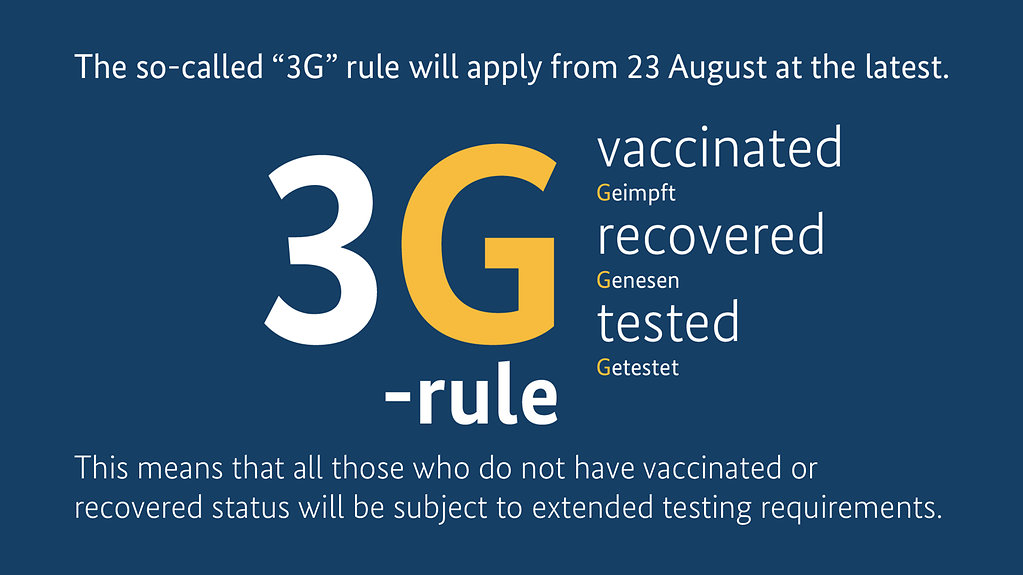Coronavirus pandemic
Federal Chancellor Angela Merkel and the Heads of Government of the Länder called on citizens to get vaccinated now, pointing out that sufficient amounts of vaccine were now available. The promise that all citizens would be offered the opportunity to be vaccinated this summer had now been fulfilled.
3 min reading time

The aim of the 3G rule is to help slow down any further increase in infections.
Photo: Bundesregierung
Federal Chancellor Angela Merkel and the Heads of Government of the Länder called on citizens to get vaccinated against the coronavirus now, remarking that Germany was no longer the EU leader when it came to vaccinations. “I ask all those who have already been vaccinated to encourage their friends, acquaintances and family members to get vaccinated, too. Not only to protect themselves, but also those who cannot be vaccinated, such as children and those who have pre-existing conditions,” Merkel said.
Coronavirus infection rates have been increasing steadily over the past few weeks. How they develop further will depend largely on how high the vaccination rate is in Germany. “The more people are vaccinated, the fewer infections we will see,” Angela Merkel explained.
The Federal Chancellor and the Heads of Government of the Länder have adopted a number of decisions regarding the coronavirus pandemic. These can be summarised as follows:
3G – vaccinated, recovered, tested
To contain the spread of the virus, it is foreseeable that individuals who are not vaccinated will need to get tested more frequently. The new testing rules will come into effect at the latest from 23 August. Where the incidence rate is above 35, those who are not vaccinated will have to present a negative coronavirus test to attend indoor events. The rule does not apply to children under the age of 6 years in general and schoolchildren. Merkel said that in view of rising infection figures, testing would be the key focus for all those who were not vaccinated.
Anyone who is not fully vaccinated or has not recovered from the illness will have to present a rapid antigen test that is no more than 24 hours old or a PCR test that is no more than 48 hours old in order to take part in any indoor events. Testing will therefore become mandatory when visiting hospitals, nursing and care homes and for access to indoor cafés and restaurants, for instance, as well as for attending celebrations and events, or using personal care services such as hairdressers’ or cosmetics studios. The same rule will apply to indoor sports and to overnight accommodation at hotels and guest houses. The Länder have the power to wholly or partially suspend the 3G rule in districts with low infection figures.
Point-of-care coronavirus tests no longer free of charge
In addition, the Federal Government and the Länder have agreed that from 11 October, point-of-care coronavirus tests will no longer be free of charge for those who are not vaccinated. Free testing will continue to be available for individuals who cannot be vaccinated or are not covered by a general vaccination recommendation: pregnant people, children and adolescents under the age of 18 in particular. Merkel said: “Seeing that we are now able to offer a vaccination to all citizens of the Federal Republic of Germany, free point-of-care testing will no longer be available from 11 October.”
Quarantine requirements: these rules apply to vaccinated individuals and those who have recovered from COVID-19
Full immunisation protects the vaccinated individual and others against the virus, and the community against another wave of infections. Those who have recovered from COVID-19 and have received a booster vaccination after six months can rely on a similar degree of immunity. This is why vaccinated individuals and those who have recovered from COVID-19 are exempted from federal and regional testing requirements. Furthermore, quarantine requirements will no longer apply to close-contact individuals who do not display any symptoms. In addition, those who are vaccinated or have recovered from COVID-19 will not need to observe any quarantine requirements when returning to Germany from a high-risk area.
Hygiene and social distancing rules
The basic protective measures continue to apply to ensure the highest possible degree of protection against infection. These include adhering to the basic rules of social distancing, observing hand hygiene, wearing face masks indoors and regular ventilation of indoor spaces